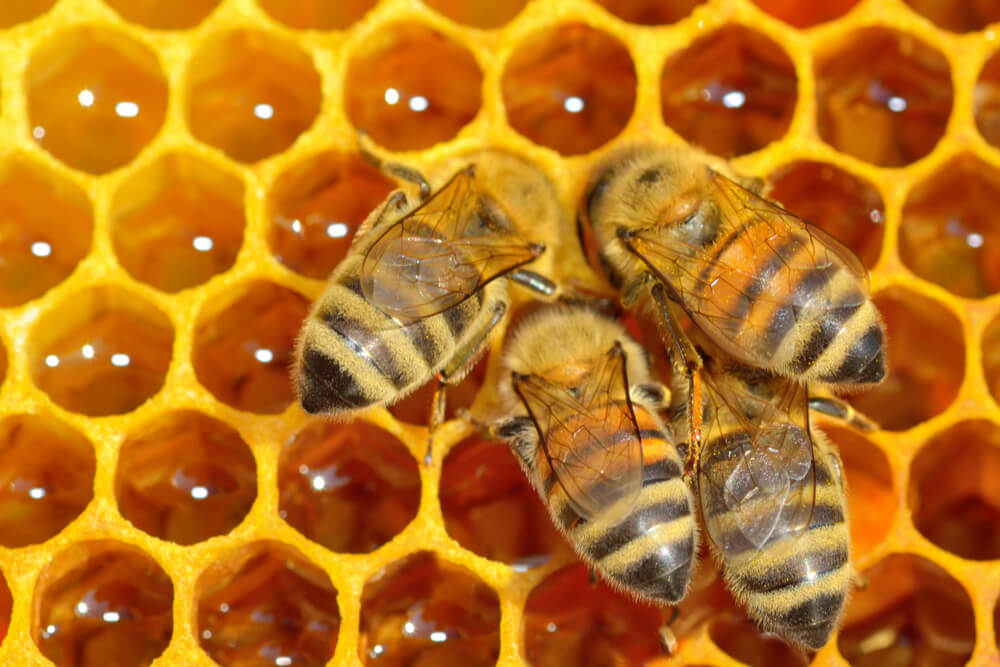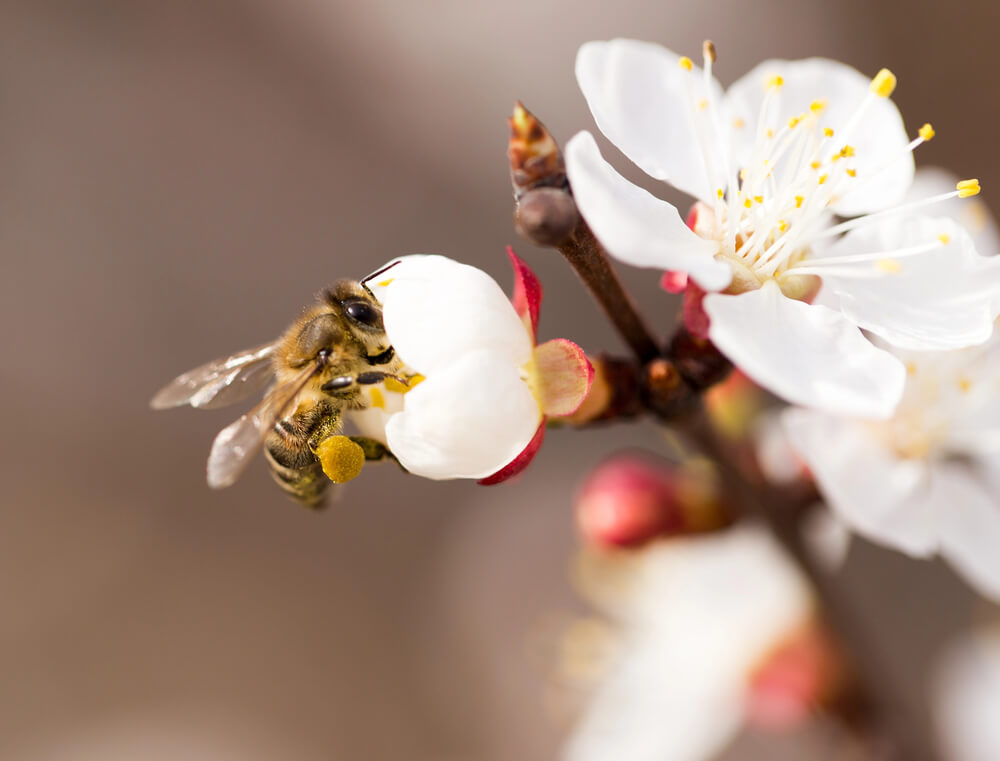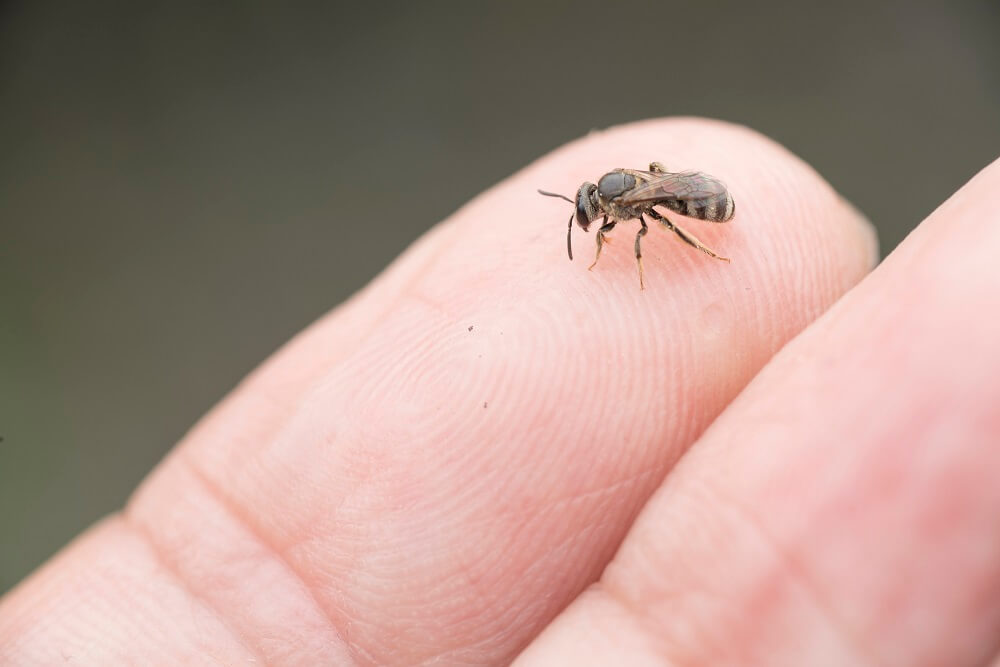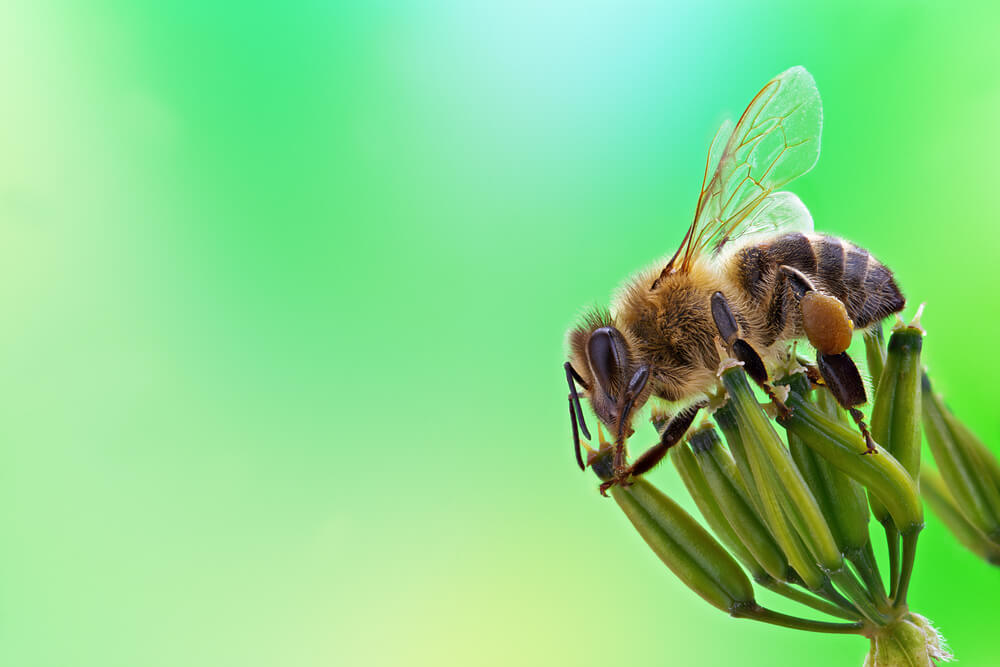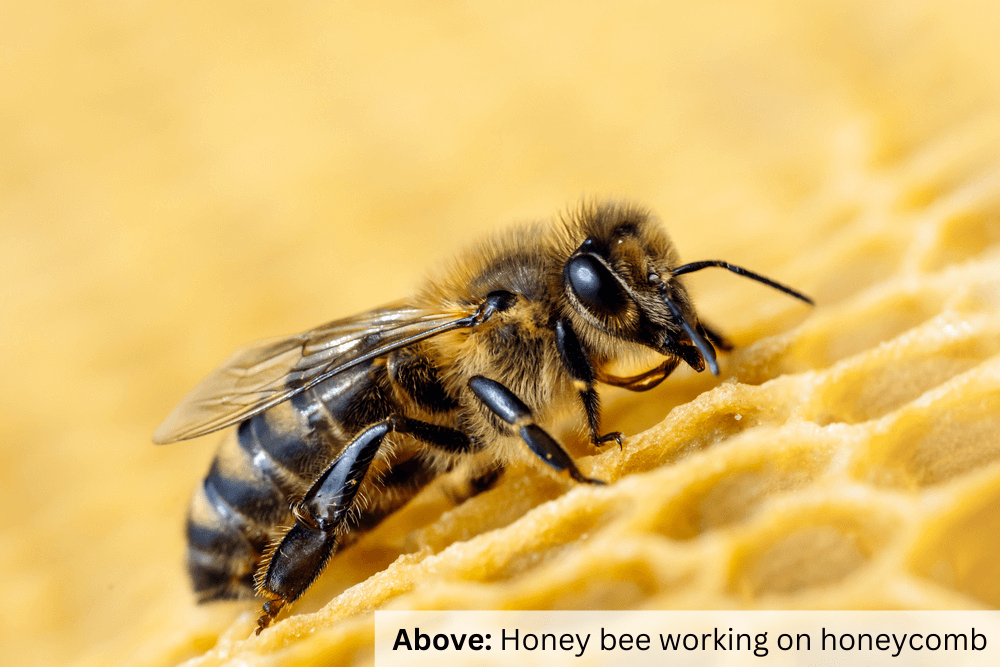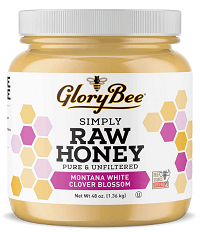Table of Contents:
What Do Bees Do With Honey?
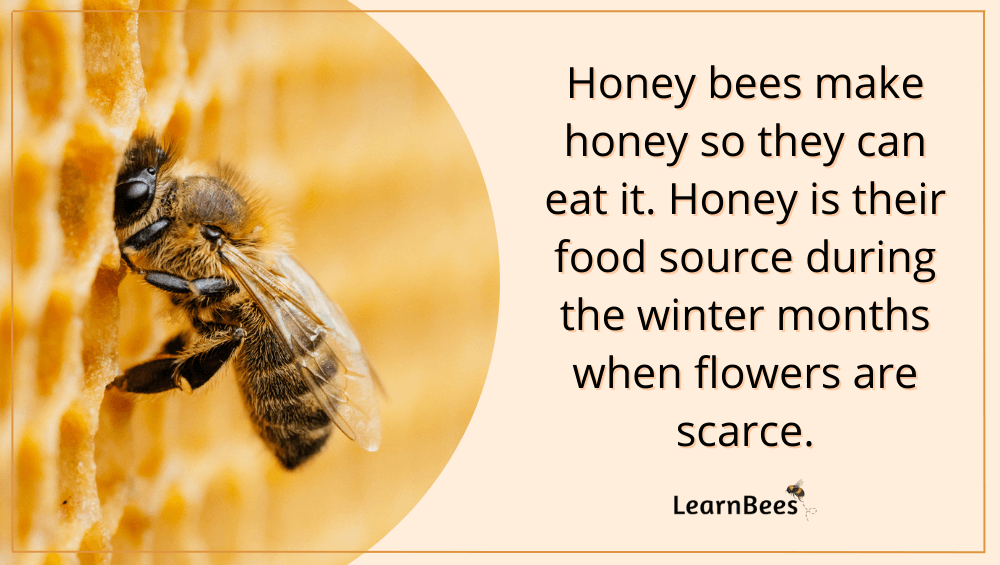
Honey bees eat honey during the winter when it’s too cold to leave the nest.
So, in a nutshell:
Honey bees work tirelessly through the warmer months to produce enough raw honey to last through winter.
You see, honey bees don’t hibernate during the winter like many other bee species do. Instead, they huddle together inside the nest to stay warm. The honey is their food storage to keep them alive until spring arrives.
Without honey, the bees would starve.
Now you might be thinking…
But what about other types of bees? Do they produce honey, too?
You might be surprised to know that most bee species don’t produce honey. However, some bee species, like bumble bees, do produce honey. That said, bumble bees only produce honey in small amounts.
But honey bees are different.
Honey bee colonies are large, often containing upwards of 40,000 bees. These large colonies allow the bees to produce a lot of raw honey.
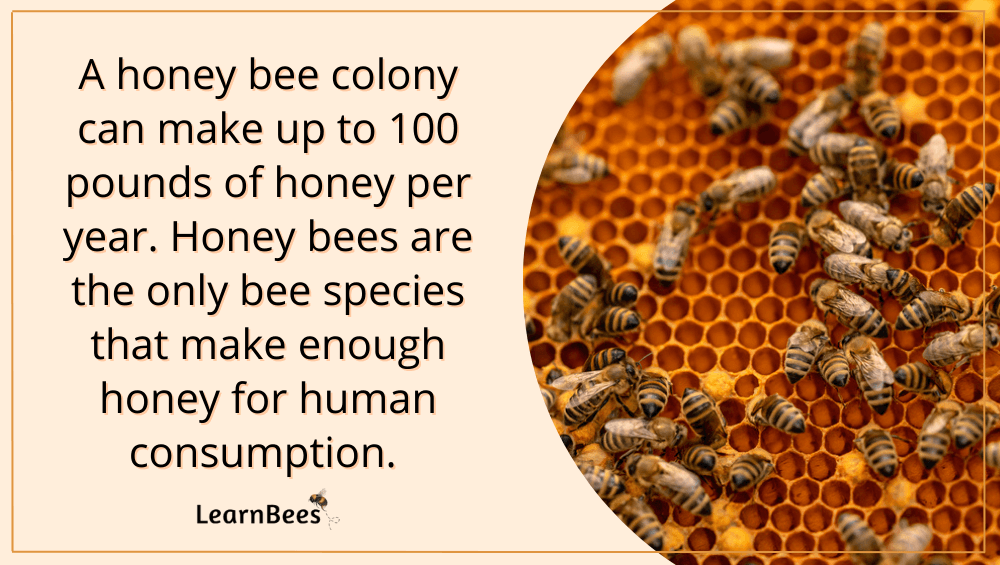
For example, a healthy colony can make between 50 and 100 pounds of honey annually.
Now compare that to bumble bees.
Bumble bee colonies are much smaller, with typically less than 400 bees. As such, bumble bees don’t have the sheer amount of bees necessary to produce as much honey as honey bees.
But that’s not all.
Bumble bee colonies don’t overwinter like honey bees do.
The worker bumble bees die off by the late fall and leave only the queen bumble bee behind. The queen then goes into hibernation – where she burns little fuel, and neither eats nor drinks. This explains why queen bumble bees don’t rely on honey to keep them alive during the winter.
As spring emerges, the queen bumble bee comes out of hibernation and lays eggs to replace her colony.
In contrast?
Honey bee colonies don’t hibernate. Instead, they remain active by huddling together in “winter clusters.” The bees vibrate their bodies to produce heat and stay warm.
Staying active during the winter burns energy that needs to be replenished.
This is where honey comes in.
Honey gives honey bees the fuel needed to survive. That is, they survive until the weather warms up enough for them to leave the nest in search of flowers.
What Do Bees Eat When We Take Their Honey?
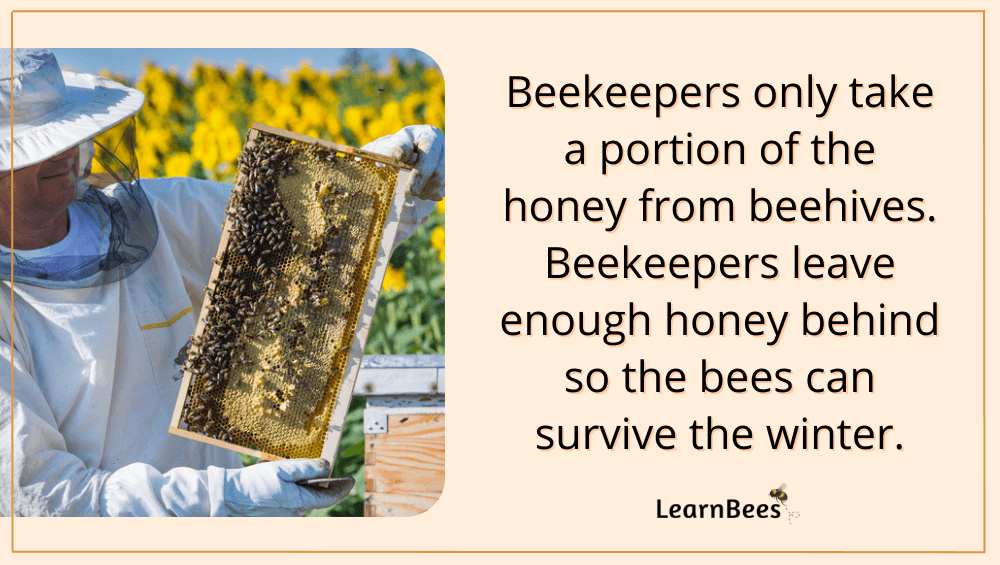
Beekeepers don’t take all of the honey from a honey bee hive. They will leave enough honey behind so the colony can survive the winter.
In fact, honey bees are jokingly referred to as “hoarders” because they make excess honey during the warm months. In other words, these hard-working little bees are always “saving for a rainy day.”
Now, this is where honey harvesting comes in.
Since honey bees produce more honey than they need, this allows the beekeepers to harvest the excess.
But here’s the thing:
Sometimes beekeepers won’t take any honey from a hive.
For example, first-year honey bee colonies are smaller and less established. These new colonies typically don’t produce enough extra honey to harvest. As a result, beekeepers will wait until the second year to collect any honey.
The amount of honey a beekeeper harvests also depends on the climate.
For example:
Honey bees living in warm climates can require as little as 40 pounds of honey to make it through the winter. This is because winters are short, and flowers bloom earlier in the year. As such, beekeepers can take more honey from these hives.
In colder climates, honey bees may need 80 or 90 pounds for the winter.
What Do Bees Use to Make Honey?
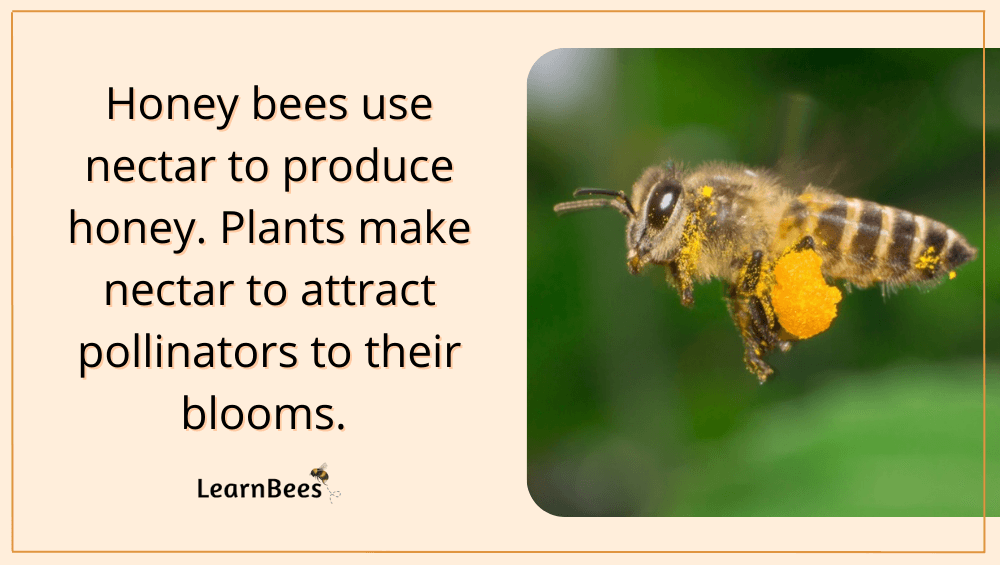
Honey bees use nectar from flowers to make honey. Nectar is a sugary liquid that flowers produce to attract pollinators.
Think about it like this.
Plants need pollination to reproduce.
Pollination involves moving pollen from one flower to the flower of another plant of the same species. But many plants need help with pollination since they’re immobile. As such, plants attract bees to their flowers by offering nectar as a reward.
Nectar provides bees with the carbohydrates they need to perform daily tasks.
As the bees slurp the nectar, they also collect pollen grains on their fuzzy bodies. From there, some pollen grains fall off their bodies as they move between flowers.
This process is called pollination.
When honey bees collect the nectar, they store it inside an internal organ called the “honey crop.” The honey crop allows them to transport the nectar back to the nest so they can use it to make honey.
FAQs on “What Do Bees Do With Honey?”
- Can bees eat their own honey?
- Why do bees make honey if they don’t eat it?
- What do bees do with honey if we don’t take it?
- Do bees get upset when we take their honey?
- Do bees turn sugar into honey?
- Do bees eat honey or just make honey?
- Do bees eat honey in the winter?
- Do bees eat honey in the summer?
Can bees eat their own honey?
Yes, honey bees eat their own honey. It’s an excellent source of carbohydrates for them and provides them with the energy needed to survive the winter.
So, in summary:
Honey bees don’t just produce honey for the sake of making honey.
Honey is a food source for honey bees when nectar sources are unavailable. For instance, most flowers go dormant during the winter, and the temperature drops. Such conditions aren’t ideal for bees.
Why?
Because bees thrive in warm weather. They spend their time and energy producing honey while it’s warm outside because they won’t have the opportunity to during the winter.
And as mentioned earlier, beekeepers will leave enough honey for the colony to survive. This means bees will have plenty of honey to eat in the winter when nectar is unavailable.
That said, sometimes bees will eat their honey during the summer when there is a nectar dearth. Nectar dearths occur when the nectar-producing flowers are in short supply during a particular season. An example includes summer droughts when flowers wilt due to excess heat and little rainfall.
So, if no other food source is available, honey bees will eat their own honey to stay alive.
—> Go back to the FAQs on “What Do Bees Do With Honey?”
More to Explore:
Why do bees make honey if they don’t eat it? Do bees actually use their honey?
Contrary to what some believe, honey bees do eat their honey. Bees don’t just make honey for the sake of making honey. Honey is used as a food source when nectar sources are unavailable or in short supply.
For example, honey is an important food source in drought and cold weather. Honey bees need honey to survive the winter when nectar-producing flowers are scarce or dormant.
Honey is a nutritious food source that provides essential carbohydrates and minerals to the bees. It helps them make the energy to keep themselves warm during cold weather.
—> Go back to the FAQs on “What Do Bees Do With Honey?”
More to Explore:
What do bees do with honey if we don’t take it?
Honey bees will eat the honey they need and save the rest that they don’t.
Honey bees are known for producing more honey than they need. These creatures are hard workers that are always planning ahead. It’s very common for strong colonies to produce much more excess honey than they actually need.
However, producing excess honey is natural for honey bees, so they know how to manage it.
—> Go back to the FAQs on “What Do Bees Do With Honey?”
More to Explore:
Do bees get upset when we take their honey?
Assigning human emotions such as “upset” and “anger” to bees is unreasonable.
That said, bees can become protective over their nest during hive inspections or honey harvests. This is why beekeepers wear beekeeping suits. Beekeeping suits help to protect the beekeeper from getting stung.
But here’s the thing:
Some hives are more mild-mannered than others. Beekeepers get to know their bees and understand which colonies are calmer than others.
The good news is that harvesting honey doesn’t hurt the bees as long as the beekeeper leaves enough behind. This is why beekeepers are careful to leave enough honey for the colony before they harvest. And, if a colony doesn’t produce enough honey, beekeepers will provide them with a supplemental food source.
So, in conclusion, it’s not accurate to say that bees are “upset” by the honey harvest. Beekeepers are attentive to their bees’ needs and ensure they have enough honey before any harvests.
With this in mind, bees have enough honey to survive and plenty of energy to make it through the winter. That way, the colony can thrive, and the beekeeper can take some honey.
—> Go back to the FAQs on “What Do Bees Do With Honey?”
More to Explore:
Do bees turn sugar into honey?
Bees don’t turn sugar into honey. Honey is made from the nectar that bees collect from flowers.
Here’s how it works:
Bees will fly from flower to flower and suck up the nectar with their tongues. This nectar is stored in a special organ called a honey crop. From there, the nectar is taken to the hive and mixed with enzymes from the bee’s saliva. This helps break down the nectar’s complex sugars and converts them into simple sugars.
The bees then spread the nectar throughout the honeycomb cells, fanning it with their wings to evaporate the moisture. Once the liquid has evaporated and thickened, it turns into a thick syrup known as honey.
So, to answer the question, no, bees don’t turn sugar into honey. They collect nectar from flowers and convert it into honey. And, since honey bees are constantly foraging for nectar, they create an ample honey supply.
This is why beekeepers can harvest so much honey every year.
—> Go back to the FAQs on “What Do Bees Do With Honey?”
More to Explore:
Do bees eat honey or just make honey?
Honey bees both make and eat honey. They use it as a source of energy, especially in times when nectar-producing flowers aren’t blooming.
Honey serves as a food source for the entire colony. The bees will store excess honey in the comb and feed on it when needed.
—> Go back to the FAQs on “What Do Bees Do With Honey?”
More to Explore:
Do bees eat honey in the winter?
Yes, bees eat honey in the winter, when food sources such as flower nectar are scarce or dormant.
Honey is a nutritious food source that provides essential nutrients and energy for bees. It also helps them make the energy to keep themselves warm during cold weather, which is necessary for survival in winter.
—> Go back to the FAQs on “What Do Bees Do With Honey?”
More to Explore:
Do bees eat honey in the summer?
Yes, bees will eat honey in the summer during nectar dearths.
A nectar dearth is when nectar-producing flowers are not blooming or blooming in limited amounts. During these periods, bees will eat honey to meet their energy needs. Flying and foraging for food burns a lot of fuel, so bees need to replenish their energy reserves quickly.
Beekeepers will often supplement their hives with sugar syrup during times of nectar dearth. This helps ensure that the bees have enough energy to keep their hive going until more flowers bloom.
